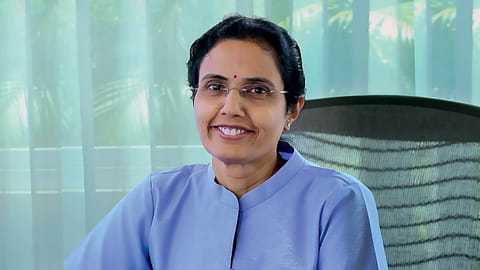Heritage Foods Bets on Premium Dairy Play
The company focuses on value-added products such as curd, paneer, cheese and cold coffee to cash in on a growing industry.

This story belongs to the Fortune India Magazine March 2024 issue.
INDIA IS THE WORLD’S largest milk producer, accounting for 24% of global production. The domestic dairy sector has seen a paradigm shift in recent times, with a surge in consumer demand for convenience and freshness prompting companies such as Heritage Foods to bet on value-added products such as curd, paneer, cheese and cold coffee for growth.
Sales from the company’s value-added product portfolio grew 34% YoY in FY23, CEO Srideep Kesavan tells Fortune India. It launched 14 new value-added products across four categories, including new milkshake and ice cream flavours. “In FY24, we are tracking a growth of 18.7%, which will help us end the year with revenues upward of ₹3,800 crore. A large percentage of this growth is contributed by value-added products,” he adds. Heritage Foods now ranks among the top 10 (from 13 in 2023 to 9 in 2024) in The Next 500 list.
Established by former Andhra Pradesh chief minister Chandrababu Naidu in 1992, Heritage Foods launched Heritage Happiness Centres — branded stores which act as sales and redistribution points as well as milk booths known as Heritage Parlours, and upped its presence on quick commerce channels such as Zepto, to foray deeper into the Indian market. There are currently 250 Heritage Happiness Centres and over 850 Heritage Parlours across the country. The dairy major has also tied up with 27 organised retail chains such as Reliance Retail, DMart and Big Basket and 16 e-commerce websites.
Besides betting on value-added products, Heritage Foods is strengthening its procurement and distribution capabilities. It also plans to expand deeper into metros and Tier-II cities to reach its milestone of ₹6,000 crore in revenues in the next three-four years, from ₹3,427 crore in FY23. With sales networks in 11 states, the company added 20,000 farmers to its network through 1,600 new procurement centres last fiscal. It also ensured that chilling centres are located close to villages it procures from, to keep the milk fresh. “We make sure that our chilling centre is available within a 50 km radius of the farmer... on the other hand, our processing factories are (located) closest to the consumer, which ensures that when a product is delivered, it is not transported across hundreds of kilometres but delivered fresh,” says Kesavan. In FY23, the company expanded its chilling capacity to 2.2 million litres per day (215 chilling centres/bulk coolers), from 2.1 million litres per day in FY22 (187 bulk coolers, mini chilling and chilling centres).
Heritage Foods expects the shift in consumer behaviour and growing consciousness about health and nutrition to fuel the consumption of dairy products in the country. “We are seeing a significant shift in consumer awareness and attitude towards nutrition… Especially in urban areas, people are aware of high fat, high salt and high sugar products, and are switching to better products, which are high protein, high calcium, etc. It’s resulting in growth in (demand for) dairy products,” says Kesavan.
“If (people were) to increase their dairy intake that doesn’t mean they’re going to drink five cups of tea (with milk) in a day, instead of two... it is going to happen through new occasions. For example, instead of a low-protein meal, people might add paneer to their meal, or instead of a plain vegetable sandwich, they might go for a cheese vegetable sandwich,” he adds.
The domestic dairy industry is riding on value-added products for growth, agrees Shashi Kant Singh, partner, agriculture, PwC India. “Products such as probiotic yogurt, fortified milk and specialty cheeses will be market drivers in the future,” says Singh.
More Stories from this Issue
“For Indians, dairy is a big source of protein,” says Anand Ramanathan, partner and consumer industry leader, consulting, Deloitte India. “Secondly, profitability is a challenge in this business, because milk, per se, is not a profitability driver, it’s a volume driver. Profits come from value-added products,” he adds.
Other dairy companies, including Mother Dairy and Parag Foods, are also expanding their premium product portfolio. Mother Dairy, which plans to introduce over 100 new products in the next three years, launched its ready-to-consume custard, and multiple ice cream and cold coffee variants last year. Mumbai-based Parag Milk Foods’ revenue contribution from value-added products grew to 69.3% in FY23, from 66% in FY19.
Strengthening the farmer network will be another mainstay of Heritage Foods’ expansion plans. The company, which works with 2.5 lakh farmers across 11,000 villages in nine states, started registering them on its Vet+ app in FY23. The app provides farmers the latest on farming techniques, weather updates, or how much money the dairy firm owes them.
Dairy is a challenging business, with inadequate cold storage capacity in the country being a key hindrance to growth, says Kesavan. “If you’re an FMCG business, you can just go out and appoint distributors… We need distributors who have a cold room, refrigeration facilities, etc., so it’s not so easy to expand,” he concludes.
(INR CR)